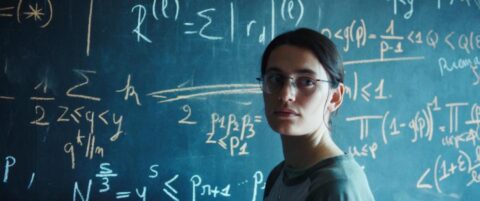Goldbach’s Conjecture is one of the most famous of all unsolved mathematical number theories. To put it simply, it states that all even integers over two are the sum of two prime numbers. So 6 = 1+5 and 8 = 1+7. It’s easy to figure out in the early stages. But when you are dealing with an infinite amount of numbers, it becomes increasingly difficult, perhaps impossible, to crack.
Perhaps equally impossible to solve are compelling films about people figuring out complex mathematical formulas without falling into scriptwriting 101. At certain moments, Cannes Special Screening Marguerite’s Theorem (Anna Novion, 2023) appears to momentarily escape self-perpetuating cliché, before horribly falling back on the most basic filmmaking binaries.
Marguerite (Ella Rumpf) is a brilliant, young mathematician with the quixotic aim of making Christian Goldbach proud. Her supervisor Werner (Jean Pierre Darroussin) appears to be on her side, until he hires a second student, Lucas (Julien Frison), to help him prepare for an all-important conference in Lausanne. Lacking the time to help Marguerite prove some equations, her algorithms are pulled apart in a seminar, leading to her dramatic exit from the prestigious Ecole Normale Supérieure.
Rumpf, with wide-rimmed glasses and an awkward middle parting, excellently portrays Marguerite as somebody with a one-track mind, so bogged down in her work that the normal social norms don’t apply to her. She’s evidently on the spectrum, yet the film smartly avoids a simplistic mental diagnosis. For the first hour or so, her journey into the so-called real world is vividly realised, including her touching friendship with dancer Noa (Sonia Bonny), dalliances with sex and applying her skills to underground Mahjong games. Rumpf slowly but surely finds ways to open this character up, opening up a world of fascinating possibilities.
But the conjecture always lingers in the background, and it isn’t long before we have to come back down to A Beautiful Mind-level (Ron Howard, 2001) nonsense. Lots of people standing in front of blackboards filled with incomprehensible numbers and letters. Sudden euphoric moments of magically cracking the code. The return of Werner in more late-stage silliness. Even more egregious is the emergence of a lackluster romantic storyline that threatens to betray the whole point of the film, stripping Marguerite of her autonomy and chaining her to programmatic storytelling.
“Maths and emotion don’t mix,” warns Werner, seemingly criticising Marguerite’s pride getting in the way of her work. He’s also describing Marguerite’s Theorem, which also appears to prove the difficulty of making a film where people stare at complex formulas escape unproved algorithms. By the end Novion, working on a script with Agnès Feuvre, Marie-Stéphane Imbert, falls back on the laziest of all proofs: man and women equals romantic comedy success.
But they fail to show their workings, relying on their clichéd final answer to be a self-evident, emotionally stirring truth. And while maths might be all about logic, art relies on irrationality, sublimity, intangibility; that which cannot quite be expressed as a result of formula. Proving 2 + 2 = 4 is maths; proving 2 + 2 = 5 is filmmaking. Marguerite’s Theorem can certainly prove the former; it fails catastrophically at the latter.
Redmond is the editor-in-chief of Journey Into Cinema.





